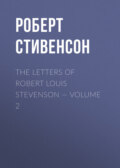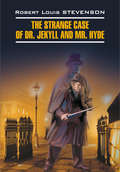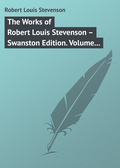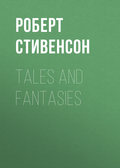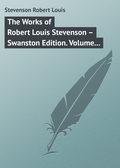
Роберт Льюис Стивенсон
The Works of Robert Louis Stevenson – Swanston Edition. Volume 23
To Dr. W. Bamford
With a copy of Travels with a Donkey.
[San Francisco, April 1880.]
MY DEAR SIR, – Will you let me offer you this little book? If I had anything better, it should be yours. May you not dislike it, for it will be your own handiwork if there are other fruits from the same tree! But for your kindness and skill, this would have been my last book, and now I am in hopes that it will be neither my last nor my best.
You doctors have a serious responsibility. You recall a man from the gates of death, you give him health and strength once more to use or to abuse. I hope I shall feel your responsibility added to my own, and seek in the future to make a better profit of the life you have renewed to me. – I am, my dear sir, gratefully yours,
Robert Louis Stevenson.
To Sidney Colvin
[San Francisco, April 1880.]
MY DEAR COLVIN, – You must be sick indeed of my demand for books, for you have seemingly not yet sent me one. Still, I live on promises: waiting for Penn, for H. James’s Hawthorne, for my Burns, etc.; and now, to make matters worse, pending your Centuries, etc., I do earnestly desire the best book about mythology (if it be German, so much the worse; send a bunctionary along with it, and pray for me). This is why. If I recover, I feel called on to write a volume of gods and demi-gods in exile: Pan, Jove, Cybele, Venus, Charon, etc.; and though I should like to take them very free, I should like to know a little about ’em to begin with. For two days, till last night, I had no night sweats, and my cough is almost gone, and I digest well; so all looks hopeful. However, I was near the other side of Jordan. I send the proof of Thoreau to you, so that you may correct and fill up the quotation from Goethe. It is a pity I was ill, as, for matter, I think I prefer that to any of my essays except Burns; but the style, though quite manly, never attains any melody or lenity. So much for consumption: I begin to appreciate what the Emigrant must be. As soon as I have done the last few pages of the Emigrant they shall go to you. But when will that be? I know not quite yet – I have to be so careful. – Ever yours,
R. L. S.
To Sidney Colvin
[San Francisco, April 1880.]
MY DEAR COLVIN, – My dear people telegraphed me in these words: “Count on 250 pounds annually.” You may imagine what a blessed business this was. And so now recover the sheets of the Emigrant, and post them registered to me. And now please give me all your venom against it; say your worst, and most incisively, for now it will be a help, and I’ll make it right or perish in the attempt. Now, do you understand why I protested against your depressing eloquence on the subject? When I had to go on any way, for dear life, I thought it a kind of pity and not much good to discourage me. Now all’s changed. God only knows how much courage and suffering is buried in that MS. The second part was written in a circle of hell unknown to Dante – that of the penniless and dying author. For dying I was, although now saved. Another week, the doctor said, and I should have been past salvation. I think I shall always think of it as my best work. There is one page in Part II., about having got to shore, and sich, which must have cost me altogether six hours of work as miserable as ever I went through. I feel sick even to think of it. – Ever your friend,
R. L. S.
To Sidney Colvin
[San Francisco, May 1880.]
MY DEAR COLVIN, – I received your letter and proof to-day, and was greatly delighted with the last.
I am now out of danger; in but a short while (i. e. as soon as the weather is settled), F. and I marry and go up to the hills to look for a place; “I to the hills will lift mine eyes, from whence doth come mine aid“: once the place found, the furniture will follow. There, sir, in, I hope, a ranche among the pine-trees and hard by a running brook, we are to fish, hunt, sketch, study Spanish, French, Latin, Euclid, and History; and, if possible, not quarrel. Far from man, sir, in the virgin forest. Thence, as my strength returns, you may expect works of genius. I always feel as if I must write a work of genius some time or other; and when is it more likely to come off, than just after I have paid a visit to Styx and go thence to the eternal mountains? Such a revolution in a man’s affairs, as I have somewhere written, would set anybody singing. When we get installed, Lloyd and I are going to print my poetical works; so all those who have been poetically addressed shall receive copies of their addresses. They are, I believe, pretty correct literary exercises, or will be, with a few filings; but they are not remarkable for white-hot vehemence of inspiration; tepid works! respectable versifications of very proper and even original sentiments: kind of Hayleyistic, I fear – but no, this is morbid self-depreciation. The family is all very shaky in health, but our motto is now Al Monte! in the words of Don Lope, in the play the sister and I are just beating through with two bad dictionaries and an insane grammar. I to the hills. – Yours ever,
R. L. S.
To C. W. Stoddard
This correspondent is the late Mr. Charles Warren Stoddard, author of Summer Cruising in the South Seas, etc., with whom Stevenson had made friends in the manner and amid the scenes faithfully described in The Wrecker, in the chapter called “Faces on the City Front.”
East Oakland, Cal., May 1880.
MY DEAR STODDARD, – I am guilty in thy sight and the sight of God. However, I swore a great oath that you should see some of my manuscript at last; and though I have long delayed to keep it, yet it was to be. You re-read your story and were disgusted; that is the cold fit following the hot. I don’t say you did wrong to be disgusted, yet I am sure you did wrong to be disgusted altogether. There was, you may depend upon it, some reason for your previous vanity, as well as your present mortification. I shall hear you, years from now, timidly begin to retrim your feathers for a little self-laudation, and trot out this misdespised novelette as not the worst of your performances. I read the album extracts with sincere interest; but I regret that you spared to give the paper more development; and I conceive that you might do a great deal worse than expand each of its paragraphs into an essay or sketch, the excuse being in each case your personal intercourse; the bulk, when that would not be sufficient, to be made up from their own works and stories. Three at least – Menken, Yelverton, and Keeler – could not fail of a vivid human interest. Let me press upon you this plan; should any document be wanted from Europe, let me offer my services to procure it. I am persuaded that there is stuff in the idea.
Are you coming over again to see me some day soon? I keep returning, and now hand over fist, from the realms of Hades; I saw that gentleman between the eyes, and fear him less after each visit. Only Charon, and his rough boatmanship, I somewhat fear.
I have a desire to write some verses for your album; so, if you will give me the entry among your gods, goddesses, and godlets, there will be nothing wanting but the Muse. I think of the verses like Mark Twain; sometimes I wish fulsomely to belaud you; sometimes to insult your city and fellow-citizens; sometimes to sit down quietly, with the slender reed, and troll a few staves of Panic ecstasy – but fy! fy! as my ancestors observed, the last is too easy for a man of my feet and inches.
At least, Stoddard, you now see that, although so costive, when I once begin I am a copious letter-writer. I thank you, and au revoir.
Robert Louis Stevenson.
To Sidney Colvin
[San Francisco, May 1880.]
MY DEAR COLVIN, – It is a long while since I have heard from you; nearly a month, I believe; and I begin to grow very uneasy. At first I was tempted to suppose that I had been myself to blame in some way; but now I have grown to fear lest some sickness or trouble among those whom you love may not be the impediment. I believe I shall soon hear; so I wait as best I can. I am, beyond a doubt, greatly stronger, and yet still useless for any work, and, I may say, for any pleasure. My affairs and the bad weather still keep me here unmarried; but not, I earnestly hope, for long. Whenever I get into the mountain, I trust I shall rapidly pick up. Until I get away from these sea fogs and my imprisonment in the house, I do not hope to do much more than keep from active harm. My doctor took a desponding fit about me, and scared Fanny into blue fits; but I have talked her over again. It is the change I want, and the blessed sun, and a gentle air in which I can sit out and see the trees and running water: these mere defensive hygienics cannot advance one, though they may prevent evil. I do nothing now, but try to possess my soul in peace, and continue to possess my body on any terms.
Calistoga, Napa County, California.– All which is a fortnight old and not much to the point nowadays. Here we are, Fanny and I, and a certain hound, in a lovely valley under Mount Saint Helena, looking around, or rather wondering when we shall begin to look around, for a house of our own. I have received the first sheets of the Amateur Emigrant; not yet the second bunch, as announced. It is a pretty heavy, emphatic piece of pedantry; but I don’t care; the public, I verily believe, will like it. I have excised all you proposed and more on my own movement. But I have not yet been able to rewrite the two special pieces which, as you said, so badly wanted it; it is hard work to rewrite passages in proof; and the easiest work is still hard to me. But I am certainly recovering fast; a married and convalescent being.
Received James’s Hawthorne, on which I meditate a blast, Miss Bird, Dixon’s Penn, a wrong Cornhill (like my luck) and Coquelin: for all which, and especially the last, I tender my best thanks. I have opened only James; it is very clever, very well written, and out of sight the most inside-out thing in the world; I have dug up the hatchet; a scalp shall flutter at my belt ere long. I think my new book should be good; it will contain our adventures for the summer, so far as these are worth narrating; and I have already a few pages of diary which should make up bright. I am going to repeat my old experiment, after buckling-to a while to write more correctly, lie down and have a wallow. Whether I shall get any of my novels done this summer I do not know; I wish to finish the Vendetta first, for it really could not come after Prince Otto. Lewis Campbell has made some noble work in that Agamemnon; it surprised me. We hope to get a house at Silverado, a deserted mining-camp eight miles up the mountain, now solely inhabited by a mighty hunter answering to the name of Rufe Hansome, who slew last year a hundred and fifty deer. This is the motto I propose for the new volume: “Vixerunt nonnulli in agris, delectati re sua familiari. His idem propositum fuit quod regibus, ut ne qua re egerent, ne cui parerent, libertate uterentur; cujus proprium est sic vivere ut velis.” I always have a terror lest the wish should have been father to the translation, when I come to quote; but that seems too plain sailing. I should put regibus in capitals for the pleasantry’s sake. We are in the Coast range, that being so much cheaper to reach; the family, I hope, will soon follow. Love to all. – Ever yours,
R. L. S.
VI
ALPINE WINTERS AND HIGHLAND SUMMERS
August 1880-October 1882
After spending the months of June and July 1880 in the rough Californian mountain quarters described in the Silverado Squatters, Stevenson took passage with his wife and young stepson from New York on the 7th of August, and arrived on the 17th at Liverpool, where his parents and I were waiting to meet him. Of her new family, the Mrs. Robert Louis Stevenson brought thus strangely and from far into their midst made an immediate conquest. To her husband’s especial happiness, there sprang up between her and his father the closest possible affection and confidence. Parents and friends – if it is permissible to one of the latter to say as much – rejoiced to recognise in Stevenson’s wife a character as strong, interesting, and romantic almost as his own; an inseparable sharer of all his thoughts and staunch companion of all his adventures; the most open-hearted of friends to all who loved him; the most shrewd and stimulating critic of his work; and in sickness, despite her own precarious health, the most devoted and most efficient of nurses.
From Liverpool the Stevenson party went on to make a stay in Scotland, first at Edinburgh, and afterwards for a few weeks at Strathpeffer, resting at Blair Athol on the way. It was now, in his thirtieth year, among the woods of Tummelside and under the shoulder of Ben Wyvis, that Stevenson acknowledged for the first time the full power and beauty of the Highland scenery, which in youth, with his longings fixed ever upon the South, he had been accustomed to think too bleak and desolate. In the history of the country and its clans, on the other hand, and especially of their political and social transformation during the eighteenth century, he had been always keenly interested. In conversations with Principal Tulloch at Strathpeffer this interest was now revived, and he resolved to attempt a book on the subject, his father undertaking to keep him supplied with books and authorities; for it had quickly become apparent that he could not winter in Scotland. The state of his health continued to be very threatening. He suffered from acute chronic catarrh, accompanied by disquieting lung symptoms and great weakness; and was told accordingly that he must go for the winter, and probably for several succeeding winters, to the mountain valley of Davos in Switzerland, which within the last few years had been coming into repute as a place of recovery, or at least of arrested mischief, for lung patients. Thither he and his wife and stepson travelled accordingly at the end of October. Nor must another member of the party be forgotten, a black thoroughbred Skye terrier, the gift of Sir Walter Simpson. This creature was named, after his giver, Walter – a name subsequently corrupted into Wattie, Woggie, Wogg, Woggin, Bogie, Bogue, and a number of other affectionate diminutives which will be found occurring often enough in the following pages. He was a remarkably pretty, engaging, excitable, ill-behaved little specimen of his race, the occasion of infinite anxiety and laughing care to his devoted master and mistress until his death six years later.
The Davos of 1880, approached by an eight-hours’ laborious drive up the valley of the Prättigau, was a very different place from the extended and embellished Davos of to-day, with its railway, its modern shops, its electric lighting, and its crowd of winter visitors bent on outdoor and indoor entertainment. The Stevensons’ quarters for the first winter were at the Hotel Belvedere, then a mere nucleus of the huge establishment it has since become. Besides the usual society of an invalid hotel, with its mingled tragedies and comedies, they had there the great advantage of the presence, in a neighbouring house, of an accomplished man of letters and one of the most charming of companions, John Addington Symonds, with his family. Mr. Symonds, whose health had been desperate before he tried the place, was a living testimony to its virtues, and was at this time engaged in building the chalet which became his home until he died fourteen years later. During Stevenson’s first season at Davos, though his mind was full of literary enterprises, he was too ill to do much actual work. For the Highland history he read much, but composed little or nothing, and eventually this history went to swell the long list of his unwritten books. He saw through the press his first volume of collected essays, Virginibus Puerisque, which came out early in 1881; wrote the essays Samuel Pepys and The Morality of the Profession of Letters, for the Cornhill and the Fortnightly Review respectively, and sent to the Pall Mall Gazette the papers on the life and climate of Davos, posthumously reprinted in Essays of Travel. Beyond this, he only amused himself with verses, some of them afterwards published in Underwoods. Leaving the Alps at the end of April 1881, he returned, after a short stay in France (at Fontainebleau, Paris, and St. Germain), to his family in Edinburgh. Thence the whole party again went to the Highlands, this time to Pitlochry and Braemar.
During the summer Stevenson heard of the intended retirement of Professor Æneas Mackay from the chair of History and Constitutional Law at Edinburgh University. He determined, with the encouragement of the outgoing professor and of several of his literary friends, to become a candidate for the post, which had to be filled by the Faculty of Advocates from among their own number. The duties were limited to the delivery of a short course of lectures in the summer term, and Stevenson thought that he might be equal to them, and might prove, though certainly a new, yet perhaps a stimulating, type of professor. But knowing the nature of his public reputation, especially in Edinburgh, where the recollection of his daft student days was as yet stronger than the impression made by his recent performances in literature, he was well aware that his candidature must seem paradoxical, and stood little chance of success. The election took place in the late autumn of the same year, and he was defeated, receiving only three votes.
At Pitlochry Stevenson was for a while able to enjoy his life and to work well, writing two of the strongest of his short stories of Scottish life and superstition, Thrawn Janet and The Merry Men, originally designed to form part of a volume to be written by himself and his wife in collaboration. At Braemar he made a beginning of the nursery verses which afterwards grew into the volume called The Child’s Garden, and conceived and half executed the fortunate project of Treasure Island, the book which was destined first to make him famous. But one of the most inclement of Scottish summers had before long undone all the good gained in the previous winter at Davos, and in the autumn of the year 1881 he repaired thither again.
This time his quarters were in a small chalet belonging to the proprietors of the Buol Hotel, the Chalet am Stein, or Chalet Buol, in the near neighbourhood of the Symonds’s house. The beginning of his second stay was darkened by the serious illness of his wife; nevertheless the winter was one of much greater literary activity than the last. A Life of Hazlitt was projected, and studies were made for it, but for various reasons the project was never carried out. Treasure Island was finished; the greater part of the Silverado Squatters written; so were the essays Talk and Talkers, A Gossip on Romance, and several other of his best papers for magazines. By way of whim and pastime he occupied himself, to his own and his stepson’s delight, with a little set of woodcuts and verses printed by the latter at his toy press – “The Davos Press,” as they called it – as well as with mimic campaigns carried on between the man and boy with armies of lead soldiers in the spacious loft which filled the upper floor of the chalet. For the first and almost the only time in his life there awoke in him during these winters in Davos the spirit of lampoon; and he poured forth sets of verses, not without touches of a Swiftean fire, against commercial frauds in general, and those of certain local tradesmen in particular, as well as others in memory of a defunct publican of Edinburgh who had been one of his butts in youth (Casparidea and Brashiana, both unpublished: see pp. 14, 15, 38 in vol. 24 of the present edition). Finally, much revived in health by the beneficent air of the Alpine valley, he left it again in mid-spring of 1882, to return once more to Scotland, and to be once more thrown back to, or below, the point whence he had started. After a short excursion from Edinburgh into the Appin country, where he made inquiries on the spot into the traditions concerning the murder of Campbell of Glenure, his three resting-places in Scotland during this summer were Stobo Manse near Peebles, Lochearnhead, and Kingussie. At Stobo the dampness of the season and the place quickly threw him again into a very low state of health, from which three subsequent weeks of brilliant sunshine in Speyside did but little to restore him. In spite of this renewed breakdown, when autumn came he would not face the idea of returning for a third season to Davos. He had himself felt deeply the austerity and monotony of the white Alpine world in winter; and though he had unquestionably gained in health there, his wife on her part had suffered much. So he made up his mind once again to try the Mediterranean coast of France, and Davos knew him no more.



